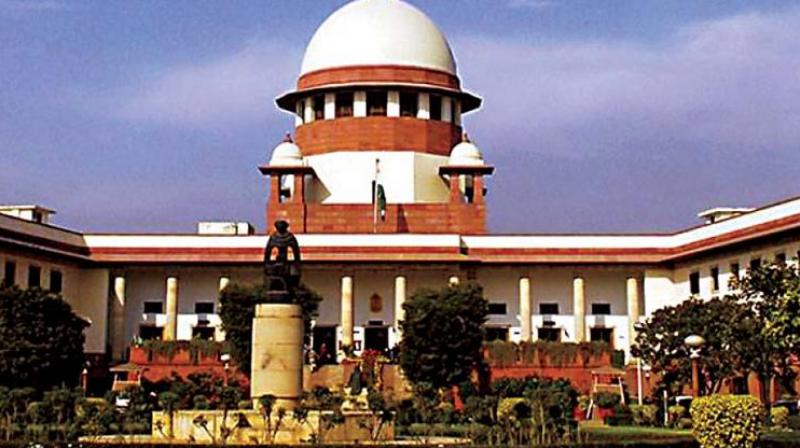Sabarimala review plea hearing from today

New Delhi: A five judge Constitution Bench of the Supreme Court will hear on Wednesday a batch of petitions seeking review of the September 28, 2018 verdict allowing women of all ages to visit the Sabarimala Ayyappa temple in Kerala.
The Bench comprising Chief Justice Ranjan Gogoi and Justices Roh-inton Nariman, A.M. Kanwilkar, D.Y. Chand-rachud and Ms Indu Malhotra will hear the petitions. On Tuesday four women filed applications seeking to intervene in support of the judgment. Two of the applicants — Bindu and Kanakadurga — had entered the temple on January 2. Some contempt petitions have also been filed.
Ms Bindu said that she has intense desire to pay her respects to “Dharma Shastha”, who is worshipped as Lord Ayyappa. Reshma Nishant and Shanila Satheesh have filed the other applications.
The apex court by a majority of 4:1 held denial of entry of women only on the ground they are menstruating violates Article 14 of the constitution, namely right to equality. The rule brought by Kerala in 1965 denying entry of women in the age group of 10 to 50 violated the right of women to worship
A batch of review petitions filed by Nair Service Society and others contended that the restriction based on age of a female is not a restriction, that amounts to discrimination on the ground of ‘only’ of sex.
The September 28 judgment based on ‘exclusionary practice’ is not ‘only’ on the ground of gender but also based on the character that the Lord manifested in the Idol is worshipped as Naishtika Brahmachri.
The failure of the learned majority Judges to consider this matter is an error of law apparent on the judgment, the petitioners said. It was argued that the followers of Lord Ayyappa hold a bonafide religious belief that the deity will not like the presence of young females and hence the females between the age of 10 and 50 years are not to enter the temple for worship. The failure to advert to this important aspect by the majority is an error of law apparent on the face of record.
If the general ground of equality under Article 14 of the Constitution is resorted to and the essential religious practices are tested on the principle of rationality, many essential religious practices may be rendered void as irrational or unjust, unfair and unreasonable and religion itself may be rendered out of existence.
It said that a regulatory provision based on essential religious practice is a matter of faith prevalent for centuries and has a reasonable relation to the object sought to be achieved viz., preserving the character and identity of Lord Ayyapa as Naishtika Brahmachari in Sabarimala temple alone.
Interestingly, the lone woman in the bench, Justice Indu Malhotra, was the sole dissenter to the majority judgment. Kanaka Durga, said that she is a believer of all Hindu gods and narrated the discriminatory practises she had to face during menstrual period, such as isolating her in another room, not permitting her to touch the well or draw water from it etc.
The petition narrates their attempt to enter temple on December 24, 2018, which got foiled due to protests. Later, on January 2, they entered the temple with police assistance. They said that the judgment needs no interference, as it does not suffer from any patent error.
The court by a majority of 4:1 held denial of entry of women only on the ground they are menstruating violates Article 14 of the constitution, namely right to equality. The rule brought by Kerala in 1965 denying entry of women in the age group of 10 to 50 violated the right of women to worship Interestingly, the lone woman in the bench, Justice Indu Malhotra, is the sole dissenter to the majority judgment.

